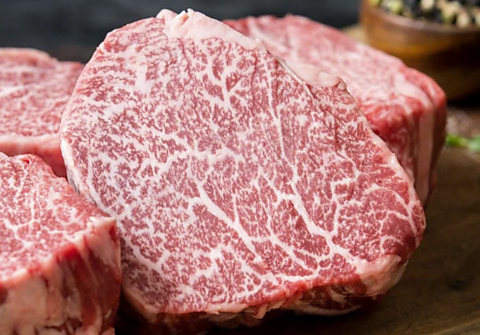Rep. Marlin Stutzman (R‑IN) introduced the “Protect American Beef Act” in early April, right before President Trump’s “Liberation Day” tariff spree. The act seeks to specifically protect US Wagyu beef producers by goading the Trump administration into putting tariffs on imported Australian Wagyu beef and genetics (semen and embryos). Stutzman is a Wagyu beef farmer, which means the congressman stands to benefit directly from a reduction in Australian Wagyu exports to the United States.
First, a quick background on Wagyu beef.
Wagyu beef was developed in Japan and is prized for its high intramuscular fat content (marbling), which makes it extremely tender, rich, and delicious (and expensive). The United States and Australia are the two largest Wagyu producers outside of Japan, which started developing their product in the 1980s and ’90s using imported Japanese Wagyu cows and genetics. Crossbreeding with non-Wagyu cows (e.g., Angus) introduced variation, and grades are assigned to the beef based on marbling and other characteristics. In the United States, beef can be labeled Wagyu if it contains at least 50 percent Wagyu genetics. Beef that is 100 percent Wagyu is “full-blood” and 93.75 percent “pure-blood.” Generally, the more Wagyu genetics, the better the product.
It’s a global trade success story.
Stutzman wants “reciprocal” tariffs on Australian Wagyu on the grounds that “Australia has an unfair competitive advantage and is a dangerous threat to Wagyu producers in the US.” He claims that the 2005 Australia-United States Free Trade Agreement “does not allow the US to export ANY beef products to Australia,” whereas Australian beef can enter the United States essentially duty-free. He also points to the Australian dollar’s weakness relative to the US dollar as putting American Wagyu exports “at an extremely uncompetitive financial advantage.”
The currency exchange rate justification for tariffs can be quickly discarded. Australia isn’t listed as a currency manipulator in the US Treasury’s reports to Congress on the international economic and exchange rate policies of major trading partners. And though it shouldn’t matter, the United States has an overall goods trade surplus with Australia.
Under the trade agreement, American beef exported to Australia would otherwise enter the country duty-free (the tariff rate is 0 percent). Stutzman obfuscates this in the bill’s language. However, he is correct that American beef is largely prevented from entering Australia.
In 2003, Australia banned the importation of American beef after a breakout of “mad cow disease” in the United States. Since 2018, the two countries have made progress in overcoming the nontariff trade barrier, but a hangup remains over the Australian government’s refusal to allow beef to enter from cows that American farmers imported from Canada and Mexico.
Australia has particularly stringent sanitary standards on meat. Although government sanitary and phytosanitary measures nominally exist to protect human and animal health, they can be used for protectionist ends. The United States is not innocent. On Sunday, the US Department of Agriculture announced the suspension of live cattle, horse, and bison imports from Mexico because of the spread of the New World screwworm (a flesh-eating parasite) into northern Mexico. While seemingly justified, it demonstrates that such measures are not unique to Australia.
The Stutzman bill calls for a 70 percent tariff, but the president would ultimately set the rate. Trump complained about Australia’s biosecurity restrictions on American beef when announcing not-so-reciprocal tariffs on most countries’ exporters. Even though, again, the United States has a goods trade surplus with Australia, the president tagged all exports from it with a 10 percent tariff, including Australian beef.
Whether Australia’s biosecurity requirements are protectionist in intent or not (it’s probably both), Australia has a world-class beef industry, and its population is about 13 times smaller than that of the United States. The US should certainly continue to seek greater access for exports to the Australian market, but it’s hard to imagine the country becoming a serious market for American beef. American consumers and importers shouldn’t be punished, regardless. That includes US fast food chains, which combine leaner grass-fed beef from Australia with higher-fat American beef to produce burgers.
As of 2023, Stutzman reportedly had amassed a herd of 24 full-blooded Wagyu cows using Japanese genetics purchased in 2017. That’s good for him and great for consumers who have become increasingly aware of Wagyu’s deliciousness. But even if the congressman’s sole motivation is to help a growing industry that he’s become part of, the result is still the same: Import taxes on Australian Wagyu would stymie domestic competition. That means higher prices for consumers. It would also hinder the ability of other farmers to raise cattle using Australian Wagyu genetics, as well as product diversification and differentiation.
















